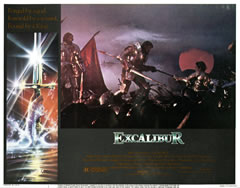Excalibur
You may click on the thumbnail images to view them full screen

Excalibur (Orion, 1981; dir. John Boorman).
Like Knights of the Round Table, John Boorman's Excalibur claims to be 'adapted from Malory's Le Morte Darthur,' though it borrows as much from Tennyson and introduces some original material as it tries to tell the whole story of Arthur, from Uther's lust for Igraine to the final battle with Mordred and the return of Excalibur to the water—in this case, by Perceval. For example, Arthur becomes the wounded king who must be healed by the Grail, which is achieved by Perceval alone. After his healing and before the final battle, Arthur rides to the nunnery to ask Guinevere to accept his forgiveness and to put her heart at rest. He proclaims that he has always loved her and that he still does, to which she responds: 'I loved you as king, sometimes as husband' and then adds, 'One cannot gaze too long at the sun.' Even though the dynamic between the characters is completely different from that in the Idylls, the meeting in the nunnery and Guinevere's comment are obviously derived from Tennyson's depiction of Arthur's visit to Almesbury and Guinevere's question in the 'Lancelot and Elaine' idyll: 'But who can gaze upon the Sun in heaven?' In the film, Guinevere does not grovel silently but speaks her mind and even voices mild criticism of Arthur. And instead of spoiling the purpose of his life, which Tennyson's Arthur says Guinevere did, she helps him to fulfill it by returning to him the sword that will allow him to 'defend what was and the dream of what could be' in his final battle. The visual beauty of certain scenes, the conception of some of the characters (Merlin and Morgan, for instance), and the controlling theme—the notion that the king and the land are one—make this one of the finest examples of Arthurian cinema.